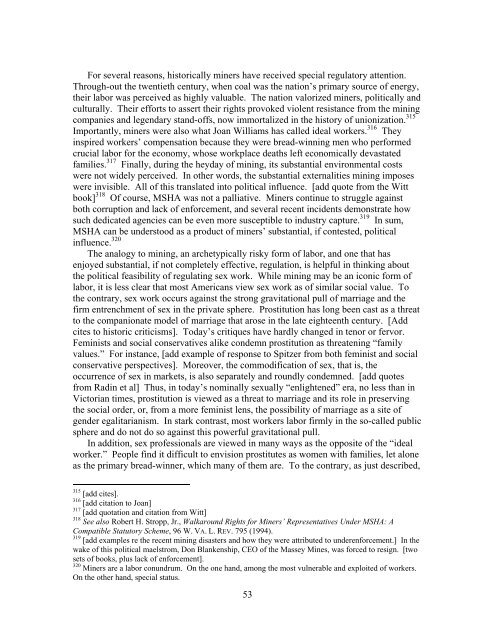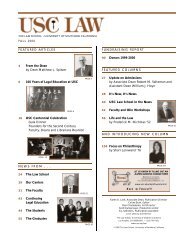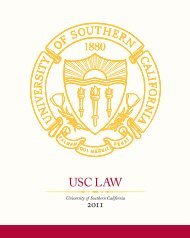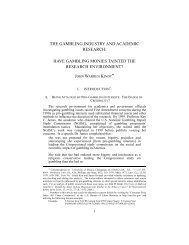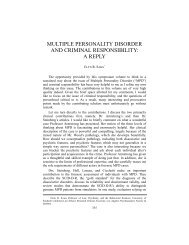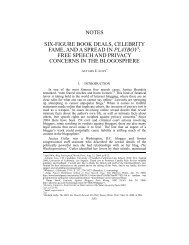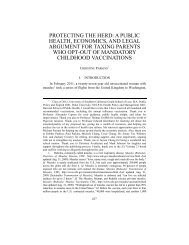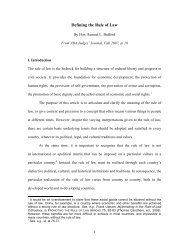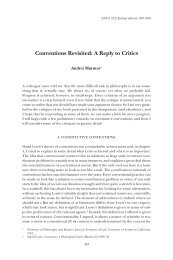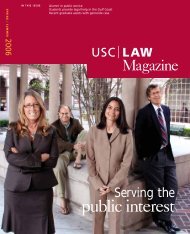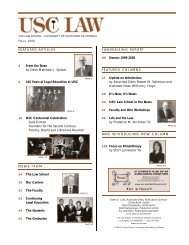1 Regulating Sex Work Adrienne D. Davis VERY ROUGH DRAFT ...
1 Regulating Sex Work Adrienne D. Davis VERY ROUGH DRAFT ...
1 Regulating Sex Work Adrienne D. Davis VERY ROUGH DRAFT ...
You also want an ePaper? Increase the reach of your titles
YUMPU automatically turns print PDFs into web optimized ePapers that Google loves.
For several reasons, historically miners have received special regulatory attention.<br />
Through-out the twentieth century, when coal was the nation’s primary source of energy,<br />
their labor was perceived as highly valuable. The nation valorized miners, politically and<br />
culturally. Their efforts to assert their rights provoked violent resistance from the mining<br />
companies and legendary stand-offs, now immortalized in the history of unionization. 315<br />
Importantly, miners were also what Joan Williams has called ideal workers. 316 They<br />
inspired workers’ compensation because they were bread-winning men who performed<br />
crucial labor for the economy, whose workplace deaths left economically devastated<br />
families. 317 Finally, during the heyday of mining, its substantial environmental costs<br />
were not widely perceived. In other words, the substantial externalities mining imposes<br />
were invisible. All of this translated into political influence. [add quote from the Witt<br />
book] 318 Of course, MSHA was not a palliative. Miners continue to struggle against<br />
both corruption and lack of enforcement, and several recent incidents demonstrate how<br />
such dedicated agencies can be even more susceptible to industry capture. 319 In sum,<br />
MSHA can be understood as a product of miners’ substantial, if contested, political<br />
influence. 320<br />
The analogy to mining, an archetypically risky form of labor, and one that has<br />
enjoyed substantial, if not completely effective, regulation, is helpful in thinking about<br />
the political feasibility of regulating sex work. While mining may be an iconic form of<br />
labor, it is less clear that most Americans view sex work as of similar social value. To<br />
the contrary, sex work occurs against the strong gravitational pull of marriage and the<br />
firm entrenchment of sex in the private sphere. Prostitution has long been cast as a threat<br />
to the companionate model of marriage that arose in the late eighteenth century. [Add<br />
cites to historic criticisms]. Today’s critiques have hardly changed in tenor or fervor.<br />
Feminists and social conservatives alike condemn prostitution as threatening “family<br />
values.” For instance, [add example of response to Spitzer from both feminist and social<br />
conservative perspectives]. Moreover, the commodification of sex, that is, the<br />
occurrence of sex in markets, is also separately and roundly condemned. [add quotes<br />
from Radin et al] Thus, in today’s nominally sexually “enlightened” era, no less than in<br />
Victorian times, prostitution is viewed as a threat to marriage and its role in preserving<br />
the social order, or, from a more feminist lens, the possibility of marriage as a site of<br />
gender egalitarianism. In stark contrast, most workers labor firmly in the so-called public<br />
sphere and do not do so against this powerful gravitational pull.<br />
In addition, sex professionals are viewed in many ways as the opposite of the “ideal<br />
worker.” People find it difficult to envision prostitutes as women with families, let alone<br />
as the primary bread-winner, which many of them are. To the contrary, as just described,<br />
315<br />
[add cites].<br />
316<br />
[add citation to Joan]<br />
317<br />
[add quotation and citation from Witt]<br />
318<br />
See also Robert H. Stropp, Jr., Walkaround Rights for Miners’ Representatives Under MSHA: A<br />
Compatible Statutory Scheme, 96 W. VA. L. REV. 795 (1994).<br />
319<br />
[add examples re the recent mining disasters and how they were attributed to underenforcement.] In the<br />
wake of this political maelstrom, Don Blankenship, CEO of the Massey Mines, was forced to resign. [two<br />
sets of books, plus lack of enforcement].<br />
320<br />
Miners are a labor conundrum. On the one hand, among the most vulnerable and exploited of workers.<br />
On the other hand, special status.<br />
53


